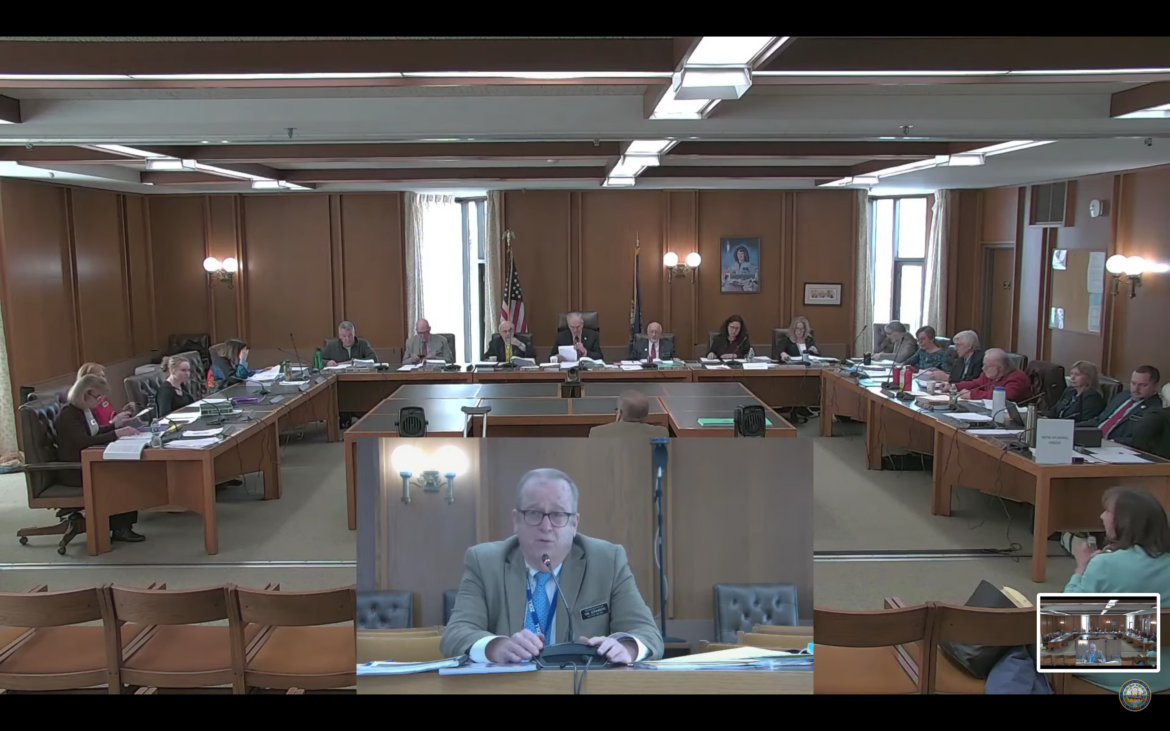By GARRY RAYNO.InDepthNH.org
CONCORD — The Statewide Education Property Tax has been the subject of several lawsuits against the state with the latest currently before Rockingham County Superior Court.
Property wealthy communities organized in opposition to the tax after it was implemented more than 20 years ago, and are now contesting claims it is unconstitutional because it allows them to retain excess money it raises to fund state adequacy grants.
However, the state relies on the tax to produce $363 million annually as part of its share of public education costs and has been reluctant to give that up.
But Thursday, a bill heard before the House Education Committee to eliminate the tax and replace the $363 million with state general fund revenue instead, received a cold shoulder.
Rep. Thomas Schamberg, D-Wilmot, said his bill would reduce taxes for all property taxpayers at a time when many find it more and more difficult to pay property taxes and stay in their homes.
“Property taxes are way out of control,” Schamberg told the committee, “every governor (since 2000) has tried to put a whale in a tub of water.”
He noted that local property taxes pay for 70 percent of the cost of public education with widely varying property tax rates from town to town.
“The situation is not sustainable,” Schamberg said, “and it is a big economic issue for the State of New Hampshire.”
He referred to the current lawsuit which claims by allowing property wealthy communities to retain excess money raised by the state property tax, adding noted tax attorney Bill Ardinger of Concord raised the issue in a letter that it is likely unconstitutional.
If the tax were eliminated, Schamberg said, it would do away with the unconstitutional argument.
“Funding education this way is an artifact of Colonial times when wealth was land holdings,” Schamberg said, “but that has shifted over time, and now does not encompass most wealth in America.”
He referred to the Education Funding Commission which met several years ago, and found that children from well-funded schools in property wealthy communities did better than students in schools in property poor communities where school funding is more difficult for taxpayers.
Schamberg quoted a constituent who said that New Hampshire’s education system reinforced inequality.
“It’s a double whammy,” he said. “They pay more and receive less.”
Schamberg said it is time to stop kicking the can down the road and have a fair and equitable system for taxpayers and students.
Committee member Rep. Valerie McDonnell, R-Salem, noted earlier this week Gov. Chris Sununu proposed a significant change to the education funding system and wondered how Schamberg’s proposal would impact the change.
Schamberg said he did not think it would clash with the governor’s proposal and might even help with his approach.
“After six years, this is the first time we heard a change from the governor about a liberal education and how to fund it,” Schamberg said.
Committee member Rep. Mike Belcher, R-Wakefield, wondered about the inequity of someone with a $250,000 home and another person with a $500,000, paying the same property taxes to fund education.
Schamberg said the Department of Revenue Administration sets the tax rates, so he could not answer the question.
Rep. Sallie Fellows, D-Holderness, suggested the committee retain the bill and wait until the biennial budget is set in June to then delve into the details and how the bill could be utilized.
She noted she worked for the Department of Education for 30 years including when the legislature decided to use the Statewide Education Property Tax to fund half of its increased commitment to public education after state Supreme Court’s Claremont education decision the state has an obligation to provide an adequate education and to fund it.
“Legislators looked at the tax bills paid by property taxpayers and identified that portion as a state tax they had paid all along,” Fellows said. “I call that smoke and mirrors.”
She said a good example of widely varying property values is how values shot up in Rockingham County versus the rest of the state, where values have gone up but not as much.
The same house in Coos County, you put in Portsmouth will have a drastically different valuation, she said, noting the changes do not equalize themselves. Cities and towns are required to do frequent reassessments, so property values are equalized across the state due to the statewide property tax.
Katherine Heck of the New Hampshire Municipal Association opposed the bill because it would go into effect July 1. She said the proposed change would require an 18-month process due to how budgets are set and acted on by residents.
She said she sees a decrease in revenue that would have to be made up with local property taxes.
Heck said if the schools cost $1 million, $1 million has to be raised to pay for it no matter where it comes from.
The bill would also do away with the low-and-moderate-income property tax relief program that received $1.3 million in the budget but has been under-utilized in recent years.
The committee will meet later to determine what recommendations to make on the bill.
Garry Rayno may be reached at garry.rayno@yahoo.com.






